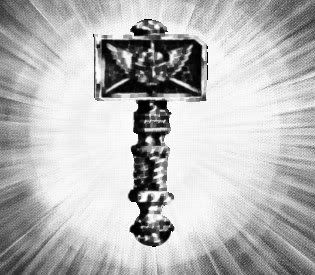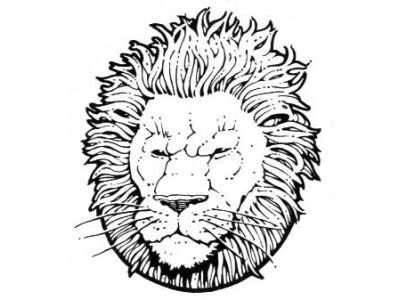Here are gods whose details have been requested.
Korrelyx
The Lord of Gods, the Last Judge
God of Justice, Leadership, Liberty, and Penalty
Domains: Knowledge, Law, Protection, Justice; prayer for spells for take place during Newday or Eventide
Typical Worshippers: Educated commoners, kings, dukes, formal positions of power
Alignment: usually LN
Symbol: a hammer engraved on a sun
Description:
The politics of the gods is a subject difficult to understand; their desire to defer to a leader is sometimes lacking of a clear motive, but in any case, Korrelyx is without a doubt the head of his pantheon. He is described as a calm king, sitting atop his throne with a spear in his right hand and a hammer in his left. His crown contains only a single jewel, but one whose glow rivals the sun. His race and countenance differs greatly with interpretation.
Sects:
Korrelyx is primarily concerned with the arbitration of other gods, and thus doesn't have many warriors and priests on the material plane. However, sometimes Korrelyx finds it more apt to find indirect means to an end, and thus his mortal servants come into play by allowing the god to act on a mortal, and consequently less conspicuous, manner. His church on the material plane, although short of clandestine, is noticeably conservative, and takes steps to make itself inconspicuous. His order of knights has little structure, and is instead simply a loose network that defers to a leader somewhere who can convene with Korrelyx directly.
Special Abilities:
The holy knight of Korrelyx is not a paladin; he is instead a judge, an arbitrater, an enforcer of his god's will. He is neither good nor evil, but lawful. Thus, he does not have an aura of good, but instead an aura of law. Furthermore, he cannot smite evil, but can smite chaos. Instead of the
remove disease, the enforcer acquires the ability to cast
mark of justice. Korrelyx is a leader, and so are his knights, who gain the leadership feat at sixth level, provided they meet the prerequisites, for free.
Doctrines:
-- The fall of balance brings the fall of order; the fall of order brings the fall of foresight. To predict the future, one must first instil balance in his environs.
-- With every unbalancing action, a backlash will inevitably occur. None can escape the destructive pendulum of balance; to ensure that the destruction is minimized, one must minimize its swing. To minimize its swing, one must minimize the unbalancing action.
-- Knowledge brings freedom; freedom brings power.
-- Even those with the ultimate foresight need leadership, for in their beliefs and motives come the potential for unbalance. Thus, even the most influential need arbitration.
-- Balance is stability; balance is equality. Balance is not nothingness. In order for order to occur, there must be subjects to be ordered.
Baltur
Lion of Truth
God of Righteousness, Justice, and Retribution
Domains: Law, Good, War, Strength, Justice; prayer for spells may take place during Highmorn or Sunhigh
Typical Worshippers: honorable, chivalrous, fearless individuals; bastions of society
Alignment: Always LG
Symbol: The golden head of a line, whose mane swirls around into what some say is the sun
Description:
Baltur, the lord of righteousness and the lion of truth, is commonly depicted as a well-muscled man with a large sword in one hand, planted in the ground, and a battle helmet in the other. Sometimes, Baltur has the head of a lion. Sometimes, Baltur is wearing platemail, but more often than not, he is clothed in simple vestments. He typically has short dark hair and dark eyes.
Sects:
Baltur's church is divided into numerous compartments, most of which are small groups of holy knights fighting until a single name. These small groups are typically very active throughout the world upholding Baltur's name, and some of them differ in some doctrines. One group for example, believes that compassion is second to justice, while another believes that compassion is a part of justice. Some believe that love brings blindness, others believe that love brings freedom. Many aspects of Baltur's doctrine are argued upon, due to the splintering of the holy knight population. Baltur, however, has a core church centered in Indoril that is much less active in terms of fighting and bloodshed, but much larger, more organized, farther reaching, and more stable. This core church, although absent of much coercive force, is often regarded as the most reliable source of Baltur's indoctrination.
Special Powers:
Holy Knights (paladins) of Baltur may smite evil* a number of times per day equal their wisdom modifier + 1/per 5 levels, to a maximum of +4 at level 20. For example, a level 6 paladin with 16 wisdom can smite evil four times per day.
*I am much more restrictive on the use of the ability, in regards to appropriate enemies, who must exhibit a unquestionable sense of malice toward the code of Baltur. This includes most undead but not all.
Doctrines:
-- By fighting the hordes of ill, a follower of Baltur imposes righteousness on the world.
-- By fighting the hordes of ill, a follower of Baltur keeps their otherwise unchecked growth from plaguing the world, and thus instils justice: balance.
-- The task of a knight of Baltur: to defend the weak, avenge the wronged, to rescue the innocent, and punish the corrupt, and to purge the wicked.
-- (argued) Justice takes many forms; balance, stability, equality, but also compassion and empathy, apart of any just being.
-- (counter) Emotion blinds the knight from delivering justice upon the world; to achieve perfection, the knight must shed all emotion: both love and fear, mercy and malice.
Justice Domain:
1, Command
2, Hold Person
3, Searing Light
4, Discern Lies
5, Mark of Justice
6, True Seeing
7, Dictum
8, Dimensional Lock
9, Storm of Veageance
--




of out it.

